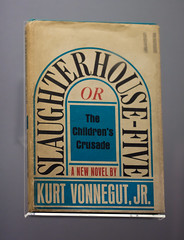War novels do not necessarily glamourise war
Slaughterhouse 5
or, The Children’s Crusade: a Duty-Dance with Death
by Kurt Vonnegut, Jr
This is a book I had been meaning to read for a long time. I bought it, some people recommended it, and I got excited and lined it up for the recent 48-hr TBR read-a-thon. Then someone else told me it was really hardgoing and I got scared of it. Then some lovely people on Twitter encouraged me to give it a go anyway so I did. Yes, it’s a little crazy but it is a great great book.
There are no surprises in this book. Everything is laid out in chapter one, which is actually a sort-of prologue, or a “Why I wrote this book”. Vonnegut’s style takes a little getting used to. It’s chatty in a realistic kind of way, by which I mean that it’s not always fluid, jumping around between subjects, but not in a stream of consciousness way.
The central story is that of Billy Pilgrim, a WWII soldier, prisoner of war, optometrist and time traveller. At least, he says that he was kidnapped by aliens on the night of his daughter’s wedding and ever since has been able to travel around in time the way they taught him to. This allows his life story to jump around in time, only dealing with the horrors of war in small chunks. I was never entirely clear how seriously we’re supposed to take the time travel thing, or whether Billy himself really believes it. But it makes sense for a person whose whole life has been coloured by the awfulness of witnessing the Dresden firebombing, who was institutionalised and became a fan of cheap science fiction, to latch onto this coping mechanism.
Vonnegut gives Pilgrim a lot of his own wartime experience, often stating things like “I was there too”. It is unclear how much Pilgrim is himself or how much Pilgrim is other people he observed during the war. Despite the awfulness of what both men observed, Vonnegut doesn’t linger on gruesome details. Though they are there, this book is primarily about the emotional impact of war. He states early on that this is an anti-war book and that is undeniably true. There is a very telling quote directed at his publisher: “It is so short and jumbled and jangled, Sam, because there is nothing intelligent to say about a massacre.”
Despite the tough subject matter and obscure manner of storytelling, this is a tender, funny book. It is moving and also oddly innocent – Vonnegut’s subtitle is certainly apt. He shows great sympathy for dogs, horses and children, which challenged my assumption that a war veteran would be hardened emotionally.
First published 1969.

Glad you read and finished it! I enjoyed this book too and I agree I wasn’t sure whether the time travelling was real or all in Billy’s mind.
It’s told in the typically Vonnegut way. Have you read other books by him? This one reminded me of my favorite by Vonnegut: Slapstick or Lonesome no more.
Glad you read this, it’s one of my favourite books. Cat’s Cradle is the other Vonnegut one that’s right up there.
The film version of Slaughterhouse 5 is worth checking out too. It cuts a lot out but given the narrative structure does a surprisingly good job.